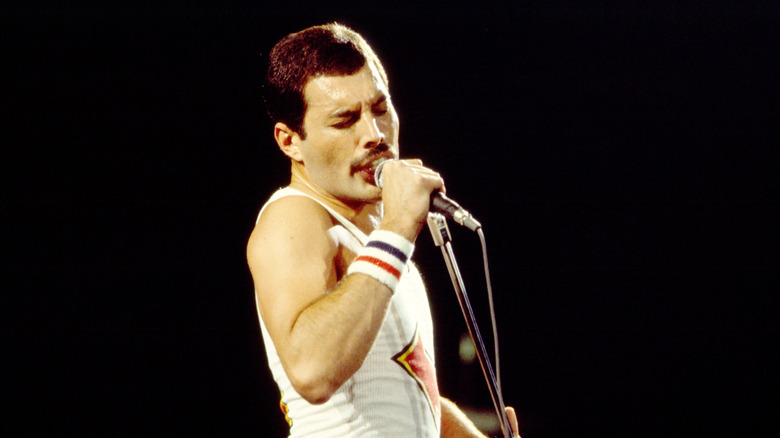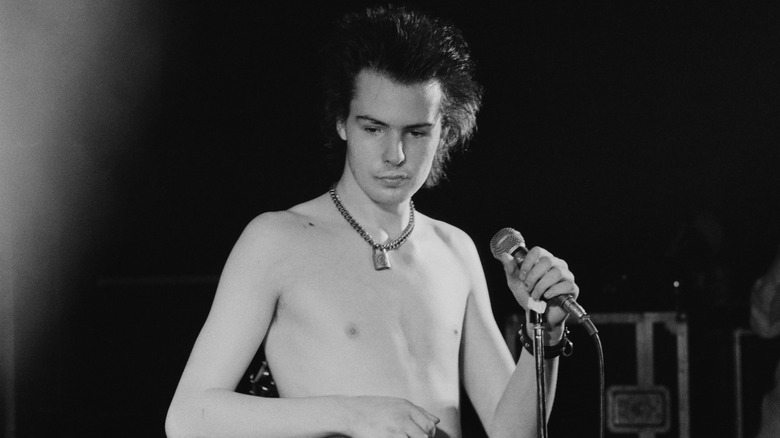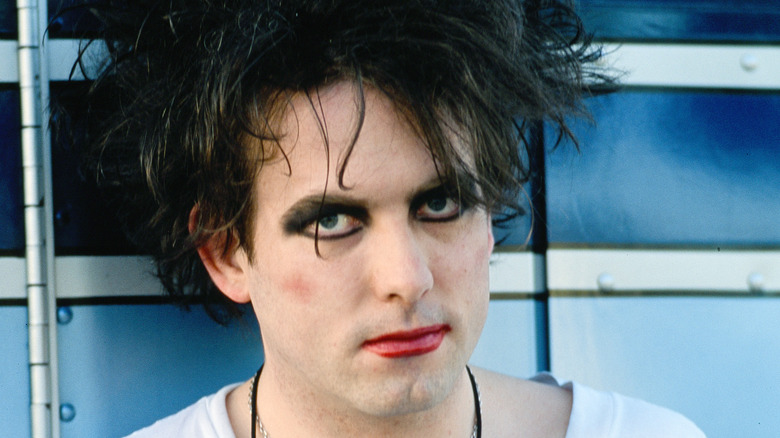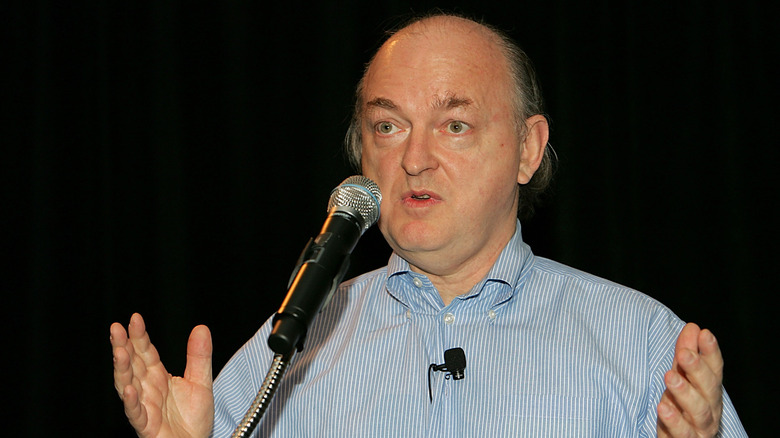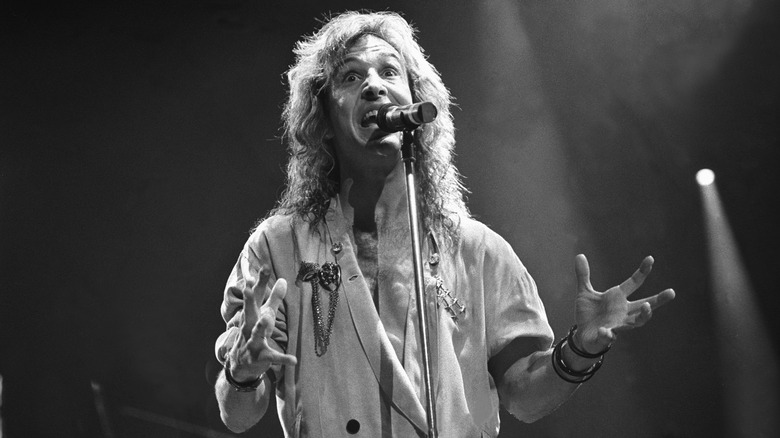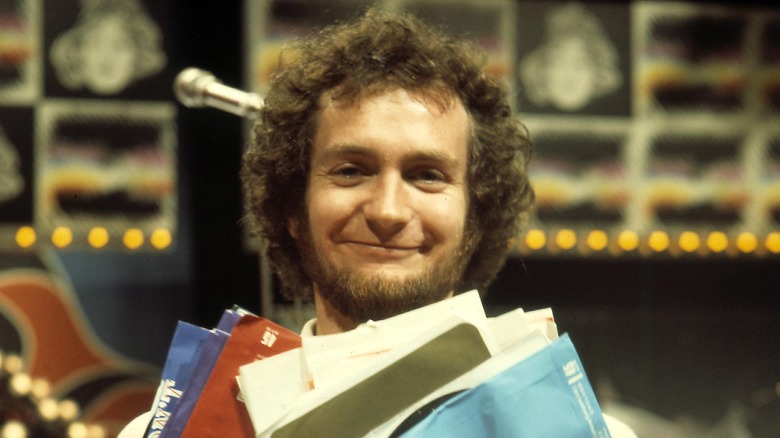Stars Who Couldn't Stand Freddie Mercury
As the huge outpouring of love for his 2018 biopic "Bohemian Rhapsody" proved, Queen frontman Freddie Mercury remains one of music's most beloved icons. Before Mercury's tragic death in 1991 at the age of 45 due to complications of AIDS, he had established himself as one of the finest rock vocalists of his generation as well as one of its most flamboyant performers. His legacy includes numerous No. 1 hit singles and albums including "We Are The Champions" and "Another One Bites The Dust," but is perhaps best encapsulated in Mercury's famous performance at Live Aid in 1985, when in the sold-out Wembley Stadium in London — and in front of a TV audience of more than 1.5 billion – he held the crowd in the palm of his hand to deliver perhaps rock music's most classic performance.
But while Mercury is now considered one of rock's greatest showmen and Queen one of the defining British rock bands of the 1970s and 1980s, they didn't always enjoy the exalted status they do today. Several of their fellow musicians have been outspoken in their dislike for the band and Mercury in particular, as have several respected music critics. Here are some of the most notable.
Sex Pistols' Sid Vicious
It is perhaps no surprise that Sid Vicious, the bassist for the notorious British punk band The Sex Pistols, wouldn't be the biggest fan of Freddie Mercury or Queen. Whereas the stadium rock Queen perfected hinged on theatrics and grand gestures, punk focussed on rawness and authenticity, and in many ways was a reaction to how arguably bloated rock music had become by the mid-1970s. However, it appears that Vicious held a deep-seated personal dislike for Mercury.
In November 1977, Vicious gave an interview with BBC Radio One in which he discussed an encounter he had with the Queen singer. "I saw Freddie Mercury in the flesh," Vicious said. "Pictures can't convey how revolting that bloke is. He's absolutely hideous, he's like an old Turk. He's got a great big blue shadow that comes right up to under his eyes. And this disgusting voice. And he warbles away about, 'Oh, the ballet is rather good this season.' He's absolutely awful. I've never met anyone like him" (via YouTube).
However, there was reportedly more to the meeting between the two men than Vicious publicly admitted. In 1977, both bands were recording separately at Wessex Sound Studios when Vicious entered Queen's recording area. Vicious sarcastically questioned Mercury about his love of ballet, a passion he was open about in interviews. Mercury then dubbed Vicious "Simon Ferocious," prompting a confrontation between the pair. It climaxed with Mercury grabbing Vicious by the lapels and throwing him out of the room.
The Cure's Robert Smith
Another British musician who has made no secret of his dislike of Freddie Mercury is Robert Smith, lead singer and songwriter of the veteran British goth rock and post-punk band The Cure. Smith is famously truculent in interviews and is happy to attack elements of culture that he just doesn't vibe with.
In 2004, Smith's band was going through an upturn in interest thanks to a new generation of indie bands emerging from the U.K. who cited The Cure's 1980s and 1990s work as their inspiration. In response, the veterans took several of them on the road and released a new self-titled album. At the same time The Cure was inspiring a new generation, a new wave of hard rock bands plying their trade with Queen-inspired theatrics, such as The Darkness, were U.K. chart darlings, much to Smith's dismay.
When asked by Rolling Stone what he thought of The Darkness, Smith responded: "Well, I never liked Queen. I can honestly say I hated Queen and everything that they did. To have that rehashed and reheated for a second time around is pretty weird. So, no, I don't like the Darkness at all. I think they're a comedy band," implying a similar opinion of Mercury's work.
Music Writer Dave Marsh
Regardless of individual musical taste, it is today taken as fact that Freddie Mercury belongs at the top table of rock frontmen, a performer whose immense charisma and stage presence electrified their most memorable performances. But not everyone was impressed by Mercury's stage abilities — in fact, even at his pomp, some of America's most respected music critics were ambivalent to his performances. The legendary journalist Lester Bangs, for example, described Queen's 1977 performances at Madison Square Garden as "'Fantasia' for dodos and 14-year-olds" in The Village Voice, while John Swenson, writing for the same magazine, described Queen as "the most pretentious metal band extant."
But worse came from Bangs' protege, Dave Marsh, who in 1979 penned a column for Rolling Stone in which he made his hatred for Mercury and Queen plain. Reviewing the band's latest studio album, "Jazz," Marsh derided it as a "dull pastiche" that highlighted Mercury's "throat-scratching vocals," and complained that through the penning of songs like "We Will Rock You" Queen "may be the first truly fascist rock band," adding, "The whole thing makes me wonder why anyone would indulge these creeps and their polluting ideas."
Kansas frontman Steve Walsh
The progressive arena rock band Kansas was formed in 1970, the same year as Queen first came together in London. Though Kansas would go on to enjoy huge commercial success later in the 1970s and for years after, their emergence was slow, only breaking into the mainstream in 1976 with the release of their third album. Before that, they established themselves as a live act with frequent support slots, and featured on the same bill as Queen — whose breakthrough came a couple of years earlier — numerous times.
In a 2003 interview with Get Ready To Rock, Kansas vocalist Steve Walsh opened up about his memories of those early days, and what it was like mixing with some of the biggest acts of the day while still laboring in relative obscurity. He described the experience as "Real good. Queen and Mott The Hoople were fantastic. Real nice people." However, he reserved some scorn for Freddie Mercury, whom he called "an a******. He was a prima donna. Diva if you will. That's about having an ego bigger than you are talented, bigger than you deserve."
British Capital Radio DJ Kenny Everett
The British Capital Radio DJ Kenny Everett played an instrumental role in making Queen one of the biggest rock acts of all time thanks to his full-throated backing of arguably their greatest song, 1975's "Bohemian Rhapsody." Though now considered a progressive rock classic which remains a popular radio song, upon its release both Queen's record label was anxious that the track's runtime of almost six minutes would make it unplayable for many commercial radio stations and delayed its release while they considered other options. However, the band themselves leaked "Bohemian Rhapsody" to Everett, who teased portions of his song to listeners before famously playing the song 14 times over two days, building excitement for its eventual release.
Everett and Freddie Mercury were also close friends for many years and spent a great deal of time together enjoying London's burgeoning gay scene and nightlife. However, in 1986 Mercury was the victim of a series of exposés in the British tabloid newspapers that cast light on his gay lifestyle, which was a secret to many of his fans at the time, as well as his cocaine use. Shortly after, he and Everett, who was also a cocaine user, had an argument over the drug, and the pair fell out.
According to Mercury's former lover Jim Hutton "They never made up ... if we'd see him out and about around the gay clubs, they never spoke. All those newspaper stories about Kenny being at Freddie's bedside were fabricated," per "Freddie Mercury: The Definitive Biography."
